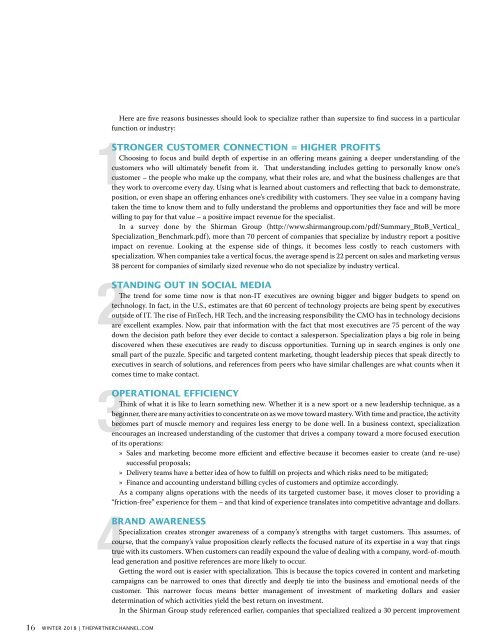The Partner Channel Magazine_Winter 2018
This is the final issue of The Partner Channel Magazine published with Jenny Davis as its editor in chief. Topics evolved around sharing your story throughout life and business. Enjoy!
This is the final issue of The Partner Channel Magazine published with Jenny Davis as its editor in chief. Topics evolved around sharing your story throughout life and business. Enjoy!
Create successful ePaper yourself
Turn your PDF publications into a flip-book with our unique Google optimized e-Paper software.
Here are five reasons businesses should look to specialize rather than supersize to find success in a particular<br />
function or industry:<br />
1<br />
STRONGER CUSTOMER CONNECTION = HIGHER PROFITS<br />
Choosing to focus and build depth of expertise in an offering means gaining a deeper understanding of the<br />
customers who will ultimately benefit from it. That understanding includes getting to personally know one’s<br />
customer – the people who make up the company, what their roles are, and what the business challenges are that<br />
they work to overcome every day. Using what is learned about customers and reflecting that back to demonstrate,<br />
position, or even shape an offering enhances one’s credibility with customers. <strong>The</strong>y see value in a company having<br />
taken the time to know them and to fully understand the problems and opportunities they face and will be more<br />
willing to pay for that value – a positive impact revenue for the specialist.<br />
In a survey done by the Shirman Group (http://www.shirmangroup.com/pdf/Summary_BtoB_Vertical_<br />
Specialization_Benchmark.pdf), more than 70 percent of companies that specialize by industry report a positive<br />
impact on revenue. Looking at the expense side of things, it becomes less costly to reach customers with<br />
specialization. When companies take a vertical focus, the average spend is 22 percent on sales and marketing versus<br />
38 percent for companies of similarly sized revenue who do not specialize by industry vertical.<br />
2<br />
STANDING OUT IN SOCIAL MEDIA<br />
<strong>The</strong> trend for some time now is that non-IT executives are owning bigger and bigger budgets to spend on<br />
technology. In fact, in the U.S., estimates are that 60 percent of technology projects are being spent by executives<br />
outside of IT. <strong>The</strong> rise of FinTech, HR Tech, and the increasing responsibility the CMO has in technology decisions<br />
are excellent examples. Now, pair that information with the fact that most executives are 75 percent of the way<br />
down the decision path before they ever decide to contact a salesperson. Specialization plays a big role in being<br />
discovered when these executives are ready to discuss opportunities. Turning up in search engines is only one<br />
small part of the puzzle. Specific and targeted content marketing, thought leadership pieces that speak directly to<br />
executives in search of solutions, and references from peers who have similar challenges are what counts when it<br />
comes time to make contact.<br />
3of its operations:<br />
OPERATIONAL EFFICIENCY<br />
Think of what it is like to learn something new. Whether it is a new sport or a new leadership technique, as a<br />
beginner, there are many activities to concentrate on as we move toward mastery. With time and practice, the activity<br />
becomes part of muscle memory and requires less energy to be done well. In a business context, specialization<br />
encourages an increased understanding of the customer that drives a company toward a more focused execution<br />
»»<br />
Sales and marketing become more efficient and effective because it becomes easier to create (and re-use)<br />
successful proposals;<br />
»»<br />
Delivery teams have a better idea of how to fulfill on projects and which risks need to be mitigated;<br />
»»<br />
Finance and accounting understand billing cycles of customers and optimize accordingly.<br />
As a company aligns operations with the needs of its targeted customer base, it moves closer to providing a<br />
“friction-free” experience for them – and that kind of experience translates into competitive advantage and dollars.<br />
4<br />
BRAND AWARENESS<br />
Specialization creates stronger awareness of a company’s strengths with target customers. This assumes, of<br />
course, that the company’s value proposition clearly reflects the focused nature of its expertise in a way that rings<br />
true with its customers. When customers can readily expound the value of dealing with a company, word-of-mouth<br />
lead generation and positive references are more likely to occur.<br />
Getting the word out is easier with specialization. This is because the topics covered in content and marketing<br />
campaigns can be narrowed to ones that directly and deeply tie into the business and emotional needs of the<br />
customer. This narrower focus means better management of investment of marketing dollars and easier<br />
determination of which activities yield the best return on investment.<br />
In the Shirman Group study referenced earlier, companies that specialized realized a 30 percent improvement<br />
16 WINTER <strong>2018</strong> | THEPARTNERCHANNEL.COM














